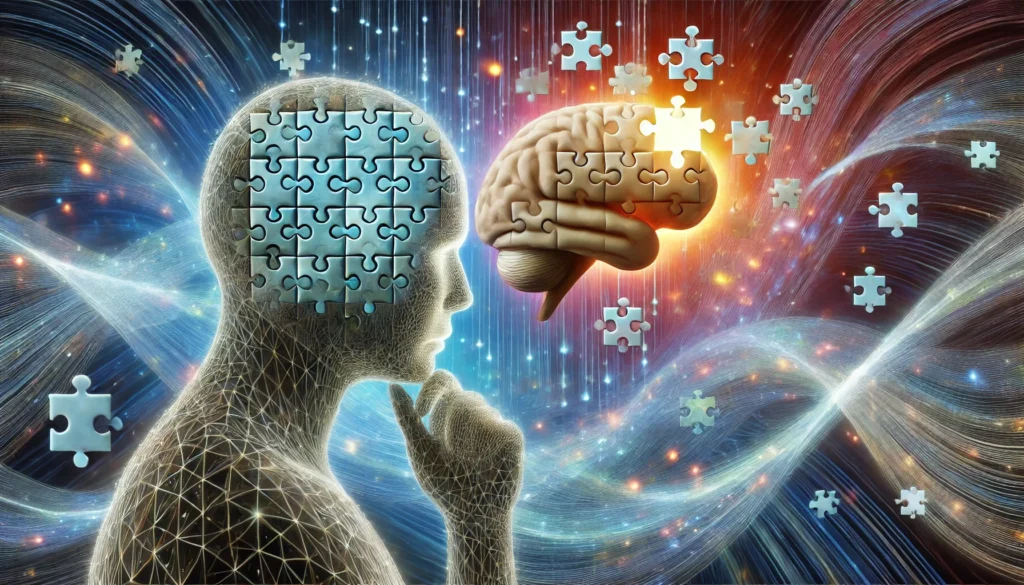Memory is a complex cognitive function involving various brain regions and processes. It can be broadly categorized into sensory memory, short-term memory, and long-term memory. Each type plays a vital role in our ability to store and recall information.
You may also like: Memory Techniques for Better Studying
The Mechanisms of Memory Formation
Memory formation involves encoding, storage, and retrieval processes. Encoding is the initial perception of information, where it is transformed into a construct that can be stored within the brain. Storage refers to maintaining the information over time, while retrieval involves accessing the stored data when needed. Understanding these mechanisms helps in identifying the stages where memory practices can be most effective.
The Role of Brain Regions in Memory
Different parts of the brain contribute to various types of memory. The hippocampus is crucial for forming new memories and connecting emotions and senses to them. The prefrontal cortex is involved in working memory and decision-making, while the cerebellum plays a role in procedural memory, such as learning skills and habits. Knowing these roles can guide targeted memory enhancement strategies.
Neurotransmitters and Memory
Neurotransmitters like dopamine, serotonin, and acetylcholine are essential for memory and learning. They help transmit signals between neurons, influencing attention, mood, and memory. Imbalances in these chemicals can affect memory function, so strategies that regulate neurotransmitter levels, such as diet and lifestyle changes, can be beneficial.
Understanding Memory Loss
Memory loss can occur due to various factors, including aging, stress, and neurological conditions. Recognizing the underlying causes of memory impairment is essential for developing effective strategies to mitigate its effects and improve cognitive function.
Working memory difficulties are a common challenge for individuals of all ages, impacting the ability to retain and process information in real time. Understanding these challenges can help in identifying effective strategies for strengthening cognitive function.
Age-Related Memory Decline
As we age, natural changes in brain structure and chemistry can lead to memory decline. This includes a reduction in the size of the hippocampus and decreased levels of neurotransmitters. However, engaging in cognitive and physical activities can help slow down these changes and maintain memory health.
While memory decline is often associated with aging, cognitive training is beneficial at all life stages. Even children can benefit from memory-enhancing activities that build a strong foundation for lifelong cognitive resilience.

Stress and Memory Impairment
Chronic stress releases cortisol, which can negatively impact the hippocampus, impairing memory. Stress management techniques such as mindfulness, exercise, and adequate sleep can help protect against memory loss. Developing resilience through stress reduction can enhance overall cognitive function.
Neurological Conditions Affecting Memory
Conditions such as Alzheimer’s disease, Parkinson’s disease, and dementia significantly impact memory. These conditions disrupt neural pathways, leading to memory impairment. Early diagnosis and intervention are crucial for managing symptoms and slowing progression, highlighting the importance of awareness and regular cognitive assessments.
Incorporating targeted cognitive exercises can help mitigate dementia symptoms and support overall brain health. These activities are designed to engage different areas of the brain, promoting mental resilience and functional independence.
Memory Exercises: Strengthening Your Cognitive Muscles
Memory exercises are designed to enhance brain function, improve recall, and boost overall cognitive health. For seniors, structured brain exercises can significantly improve cognitive agility and delay the onset of memory-related decline. Specific activities tailored for older adults can help sustain mental sharpness and enhance recall abilities.
Here are some scientifically-backed exercises to consider:
Short-Term Memory Exercises
Short-term memory, or working memory, is responsible for holding and manipulating information over short periods. To improve it, consider the following exercises:
Chunking Techniques
Chunking involves breaking down information into smaller, manageable units, making it easier to remember. For example, you can remember a series of numbers more easily by grouping them into familiar patterns. This technique leverages the brain’s natural tendency to seek patterns, enhancing memory efficiency.
Repetition for Memory Reinforcement
Repetitive learning strengthens neural pathways, facilitating easier recall of information. This could involve reading or writing information multiple times or using spaced repetition techniques, which space out review sessions to optimize memory retention over time.
Visualization and Association
Visualization involves creating vivid mental images associated with the information you want to remember. Associating new information with existing knowledge or familiar imagery can also enhance memory.
Memory Recall Exercises
Memory recall exercises focus on retrieving stored information effectively. These include:
Active Recall and Self-Testing
Active recall requires actively retrieving information from memory rather than passively reviewing it. Self-testing methods, such as flashcards or practice quizzes, encourage deeper processing and better retention of learned material, reinforcing memory.
Engaging in structured working memory tasks can strengthen cognitive skills by reinforcing information processing and recall. These exercises help improve focus, problem-solving, and overall mental agility.
Mind Mapping for Memory Connections
Mind mapping involves creating visual diagrams of information, establishing connections between concepts. This technique helps organize thoughts and enhances the ability to recall complex information by visualizing the relationships between different ideas.
Printable worksheets are an excellent way to reinforce memory training through structured exercises. They provide a guided approach to improving recall and cognitive organization.
Storytelling to Enhance Memory
Transforming facts into stories makes them more memorable by providing context and emotional engagement. Storytelling taps into the brain’s natural affinity for narratives, improving the ability to recall details and fostering long-term retention.
Cognitive Training Activities: Enhancing Brain Health
Cognitive training activities are structured programs designed to improve specific cognitive functions. Here are some popular activities:
Brain Games and Apps
Digital tools like Lumosity and BrainHQ offer games targeting memory, attention, and problem-solving skills. They adapt to your performance, providing a customized training experience.
Targeting Cognitive Domains
Brain games focus on specific cognitive domains, such as memory, attention, and problem-solving. By targeting these areas, they help enhance mental agility and strengthen neural connections, leading to overall cognitive improvements.
Engaging in memory-enhancing games is a fun and effective way to boost cognitive performance at any age. These games challenge different aspects of memory and critical thinking, making them a valuable part of any brain-training regimen.
Personalizing Training Programs
These apps often use algorithms to personalize exercises based on individual performance. This customization ensures that users are challenged appropriately, promoting continuous cognitive development and preventing plateauing of skill levels.
Monitoring Progress
Many brain training apps provide feedback and track progress over time. This allows users to see improvements and areas needing attention, motivating continued engagement with the exercises and promoting sustained cognitive gains.
Puzzles and Strategy Games
Engage in activities like Sudoku, chess, and crosswords to challenge your brain and enhance cognitive flexibility.
Problem-Solving Skills
Puzzles and strategy games require critical thinking and problem-solving skills. Engaging in these activities promotes mental flexibility and cognitive resilience, which are vital for adapting to new challenges.
Memory-focused board games specifically target cognitive skills such as attention, recall, and processing speed. These structured and engaging games are designed to enhance working memory and cognitive performance.

Enhancing Logical Reasoning
Strategy games like chess require planning and foresight, enhancing logical reasoning skills. This, in turn, supports memory by improving the ability to organize and retrieve information efficiently.
Social Interaction and Cognitive Benefits
Many strategy games involve social interaction, which can further enhance cognitive benefits. Playing with others stimulates communication skills and social cognition, contributing to overall brain health.
Meditation and Mindfulness
Practices such as meditation and mindfulness have been shown to improve attention, working memory, and overall cognitive function. Regular practice can enhance focus and reduce stress, contributing to better memory performance.
Mindfulness Meditation for Attention
Mindfulness meditation emphasizes present-moment awareness, improving attention and concentration. By focusing on the present, individuals can enhance their working memory capacity and reduce distractions, leading to better memory performance.
Stress Reduction and Cognitive Function
Meditation practices reduce stress by calming the mind and lowering cortisol levels. Lower stress levels contribute to improved cognitive function and memory by protecting the brain from the detrimental effects of chronic stress.
Integrating Mindfulness into Daily Life
Incorporating mindfulness into everyday activities, such as mindful eating or walking, can extend its cognitive benefits. Practicing mindfulness regularly promotes sustained mental clarity and emotional regulation, enhancing overall cognitive health.
Memory Boosting Exercises: Physical and Mental Synergy
Physical exercise is not only vital for bodily health but also plays a significant role in cognitive enhancement. Exercise is a powerful tool for combating memory loss, as it enhances neural plasticity and supports long-term brain health. Here are exercises that can boost memory:
Aerobic Exercise
Engaging in regular aerobic exercises like jogging, swimming, or cycling promotes blood flow to the brain, supporting neurogenesis and improving cognitive function.
Cardiovascular Health and Brain Function
Aerobic exercise enhances cardiovascular health, which in turn supports efficient blood circulation to the brain. This increased blood flow delivers essential nutrients and oxygen, promoting optimal brain function and memory retention.
Neurogenesis and Memory Improvement
Aerobic activities stimulate the production of new neurons in the hippocampus, a process known as neurogenesis. This enhances memory by increasing the brain’s capacity to store and retrieve information.
Exercise Intensity and Cognitive Benefits
The intensity of aerobic exercise can influence cognitive benefits. Moderate to vigorous activities have been shown to provide the most significant improvements in memory and cognitive function, making it important to tailor exercise programs to individual fitness levels.
Strength Training
Incorporating strength training into your routine can improve brain plasticity and enhance memory function. Activities like weight lifting and resistance exercises are beneficial.
Brain Plasticity and Memory
Strength training promotes brain plasticity by encouraging the growth of new connections between neurons. This supports memory by enhancing the brain’s ability to adapt and reorganize itself in response to new information.
Hormonal Benefits of Strength Training
Resistance exercises can increase levels of growth factors, such as BDNF (brain-derived neurotrophic factor), which support memory and learning. These hormonal changes contribute to improved cognitive function and resilience against memory decline.
Balancing Strength and Aerobic Training
Combining strength training with aerobic exercises can maximize cognitive benefits. This balanced approach supports both brain health and physical well-being, promoting holistic cognitive enhancement.
Yoga and Tai Chi
These practices combine physical movement with mindfulness, reducing stress and improving concentration and memory.

Mind-Body Connection in Yoga
Yoga emphasizes the connection between mind and body, promoting relaxation and stress reduction. This holistic approach enhances cognitive function by fostering mental clarity and emotional balance.
Tai Chi for Cognitive Flexibility
Tai Chi involves slow, deliberate movements that improve coordination and cognitive flexibility. These benefits extend to memory by enhancing focus and attention to detail, important aspects of effective memory recall.
Stress Reduction and Cognitive Enhancement
Both yoga and Tai Chi reduce stress, which is crucial for maintaining cognitive health. By lowering stress levels, these practices protect against memory decline and support overall brain function.
Incorporating Memory Activities for Adults
Memory activities are not just for children or the elderly; adults can benefit significantly from them too. Here are some activities to consider:
Social Engagement
Interacting with others through social activities can stimulate cognitive processes and improve memory. Join clubs, participate in discussions, or volunteer to keep your mind active.
Social Interaction and Cognitive Stimulation
Engaging in social activities provides mental stimulation by encouraging conversation and interaction. This helps maintain cognitive function by challenging the brain to process new information and engage in complex social cues.
Building Supportive Networks
Social engagement fosters the development of supportive networks, which can contribute to emotional well-being and cognitive health. Having a strong social support system provides mental and emotional resources, enhancing resilience against cognitive decline.
Volunteering and Purposeful Engagement
Volunteering offers opportunities for meaningful engagement, which can boost cognitive health by providing a sense of purpose and fulfillment. This sense of purpose encourages continuous learning and cognitive growth.
Learning New Skills
Challenge your brain by learning something new, such as a musical instrument, a language, or a hobby. This not only enhances memory but also boosts overall cognitive flexibility.
The Cognitive Benefits of Learning
Learning new skills stimulates different areas of the brain, enhancing neuroplasticity and memory. Engaging in novel activities challenges the brain to form new connections, promoting long-term cognitive health.
Language Learning and Memory Enhancement
Learning a new language improves memory by enhancing attention and mental flexibility. It requires the brain to process and recall new vocabulary and grammar, strengthening memory through practice and repetition.
Musical Instruments and Cognitive Development
Playing a musical instrument involves complex cognitive processes, including memory, coordination, and auditory processing. This comprehensive engagement enhances memory by integrating multiple brain functions, supporting overall cognitive development.
Emerging Trends and Future Implications in Memory Practice
As research into cognitive health advances, new techniques and technologies for memory improvement are emerging. Here are some trends to watch:
Nootropics and Supplements
Nootropics, or “smart drugs,” are gaining popularity for their potential to enhance cognitive function. While some supplements show promise, it’s essential to approach them with caution and consult healthcare professionals.

Evaluating the Efficacy of Nootropics
The effectiveness of nootropics varies, with some showing potential benefits for memory and cognition. It’s crucial to evaluate scientific research and clinical trials to determine their efficacy and safety, ensuring informed decision-making.
Safety and Ethical Considerations
The use of nootropics raises safety and ethical concerns, particularly regarding long-term effects and accessibility. Consulting healthcare professionals and considering individual health needs is essential when exploring these options.
Integrating Supplements with Lifestyle Changes
While nootropics can offer cognitive benefits, they are most effective when combined with healthy lifestyle changes. Integrating them with a balanced diet, exercise, and mental exercises provides a comprehensive approach to memory enhancement.
Neurofeedback and Brain Stimulation
Techniques like neurofeedback and transcranial magnetic stimulation are being explored for their ability to enhance cognitive function and improve memory. These interventions hold potential but require further research to establish their efficacy.
Understanding Neurofeedback
Neurofeedback involves training the brain to regulate its activity, potentially improving memory and attention. By providing real-time feedback on brain activity, individuals can learn to optimize their cognitive function through practice.
The Promise of Brain Stimulation
Transcranial magnetic stimulation (TMS) uses magnetic fields to stimulate specific brain regions, showing promise for memory enhancement. Ongoing research aims to refine these techniques and expand their accessibility for cognitive improvement.
Ethical and Practical Implications
The use of neurofeedback and brain stimulation raises ethical and practical considerations, including accessibility and potential side effects. Continued research and regulation are necessary to ensure safe and equitable use of these technologies.

Conclusion: Empowering Your Memory Journey
Improving memory is a multifaceted endeavor involving a combination of mental exercises, physical activities, and lifestyle changes. By incorporating these techniques, you can enhance your cognitive health, boost memory performance, and stay mentally sharp.
A Personalized Approach to Memory Enhancement
Remember, the journey to better memory is personal and requires patience and persistence. Tailoring your memory practices to fit your lifestyle and cognitive goals ensures that you achieve the best results.
Sharing Knowledge and Empowering Others
Whether you are looking to share this knowledge with clients, engage your readers, or optimize your own cognitive abilities, these techniques provide a solid foundation for memory practice improvement. Educating others about memory enhancement can empower them to take charge of their cognitive health.
Embracing the Challenge of Memory Improvement
Embrace the challenge, and unlock the full potential of your mind. With dedication and the right strategies, you can overcome memory challenges and achieve greater cognitive resilience, leading to a more fulfilling and mentally agile life.
Further Reading:
Simple Memory Exercises for Dementia (Taken from Therapy)
Important Note: The information contained in this article is for general informational purposes only, and should not be construed as health or medical advice, nor is it intended to diagnose, prevent, treat, or cure any disease or health condition. Before embarking on any diet, fitness regimen, or program of nutritional supplementation, it is advisable to consult your healthcare professional in order to determine its safety and probable efficacy in terms of your individual state of health.
Regarding Nutritional Supplements Or Other Non-Prescription Health Products: If any nutritional supplements or other non-prescription health products are mentioned in the foregoing article, any claims or statements made about them have not been evaluated by the U.S. Food and Drug Administration, and such nutritional supplements or other health products are not intended to diagnose, treat, cure, or prevent any disease.


